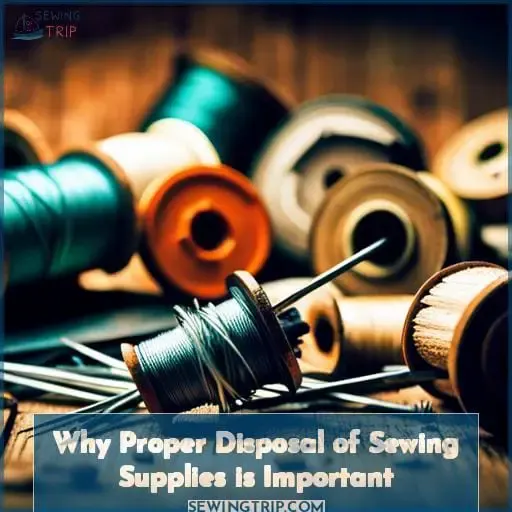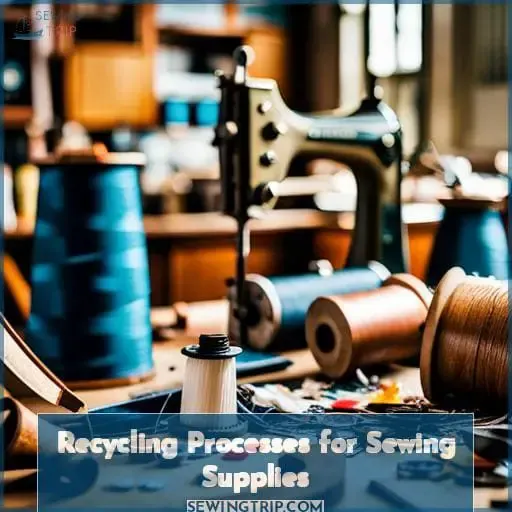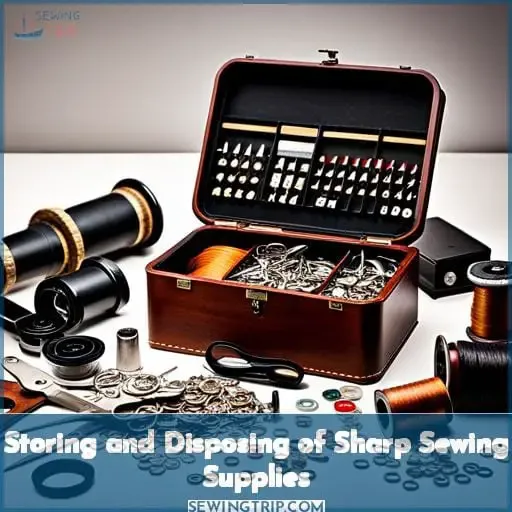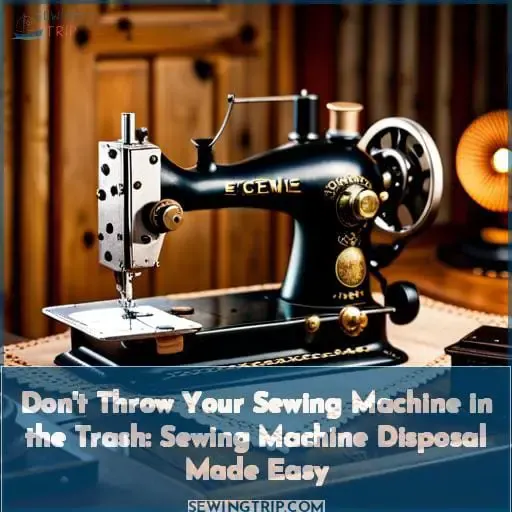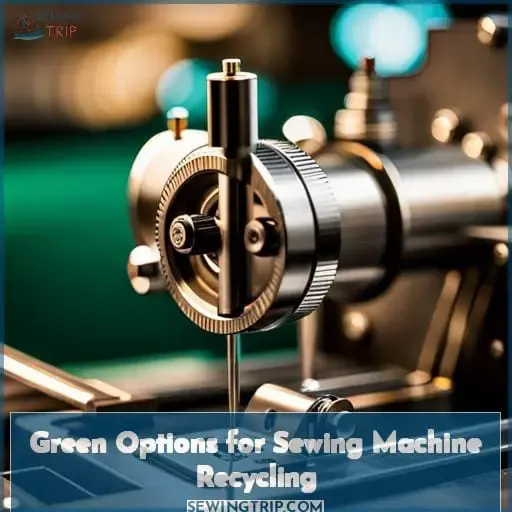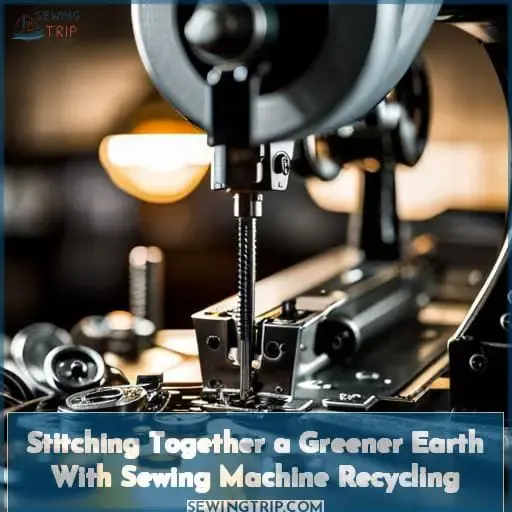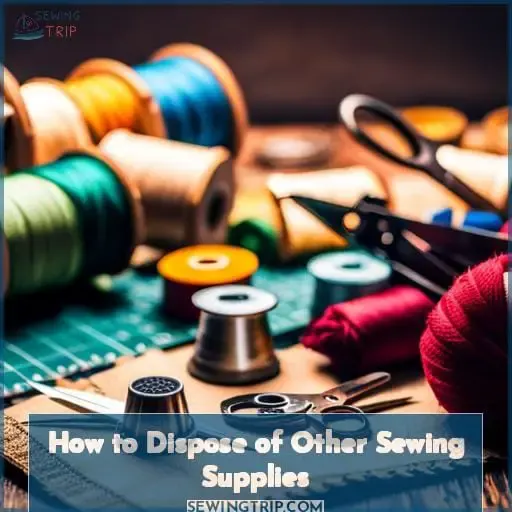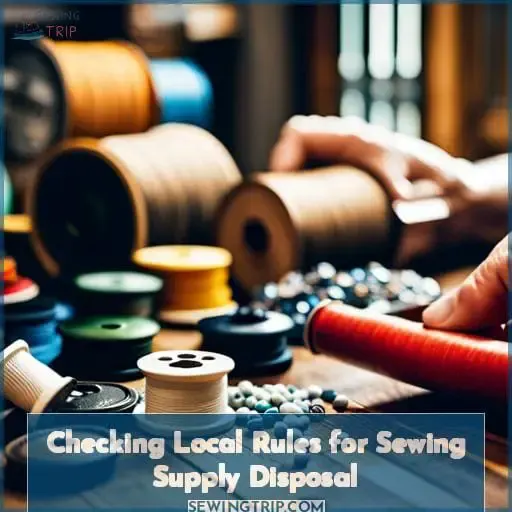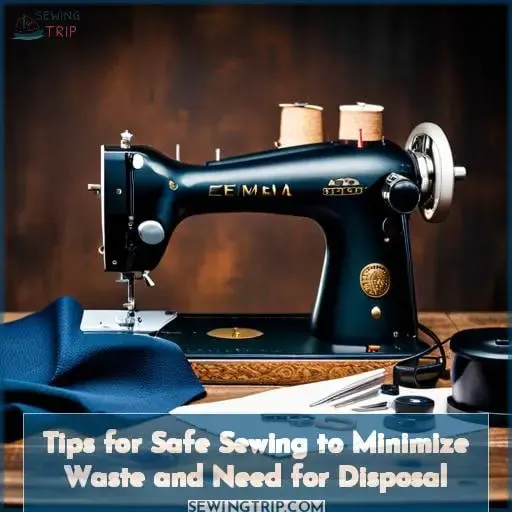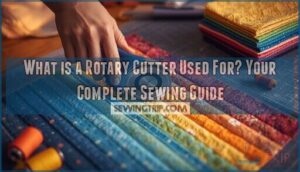This site is supported by our readers. We may earn a commission, at no cost to you, if you purchase through links.
Proper disposal of sewing supplies is like a patchwork quilt – if one piece isn’t put in the right place, it can spoil the entire masterpiece. That’s why it’s important to understand how to store and dispose of sharp needles, pins, and blades correctly.
Whether you’re getting rid of an old sewing machine or just recycling fabric scraps from your latest project, there are eco-friendly ways to keep things out of landfills while still respecting safety regulations.
Table Of Contents
- Key Takeaways
- Why Proper Disposal of Sewing Supplies is Important
- Recycling Processes for Sewing Supplies
- Storing and Disposing of Sharp Sewing Supplies
- Don’t Throw Your Sewing Machine in the Trash: Sewing Machine Disposal Made Easy
- Green Options for Sewing Machine Recycling
- Junk Removal Reviews for Sewing Machine Disposal
- Stitching Together a Greener Earth With Sewing Machine Recycling
- How to Dispose of Other Sewing Supplies
- Checking Local Rules for Sewing Supply Disposal
- Tips for Safe Sewing to Minimize Waste and Need for Disposal
- Frequently Asked Questions (FAQs)
- Conclusion
Key Takeaways
- Proper disposal of sewing supplies is important to prevent injuries, property damage, and conserve metal resources.
- Recycling and donation of sewing supplies are eco-friendly options that can help reduce waste and conserve resources.
- Local regulations should be followed for proper thread and needle disposal, and sharp supplies should be stored safely.
- Mindfulness and small actions can have a big impact on protecting the environment and creating a brighter future for generations to come.
Why Proper Disposal of Sewing Supplies is Important
You have the power to protect yourself, animals, and the environment by properly disposing of your sewing supplies. Safe storage is key in preventing injuries, damage to property or ecosystems, and conserving metal resources.
Reuse old needles when possible. Sharps containers can be used for disposal if needed. Check local recycling rules for scrap metal items like rotary blades and thread spools that cannot be reused anymore.
Sewists can extend needle life before discarding them. Only throw away those which are bent, broken, or dulled beyond repair. But do not put these in recycling bins either! Instead, store them safely until you take a full container of sharp objects such as pins, threads, needles, etc.
Recycling Processes for Sewing Supplies
Recycling your sewing supplies can provide a wealth of benefits, from preserving precious metal resources to preventing injuries and environmental damage.
Needles and pins that are beyond reuse should not end up in the trash or recycling bin. Instead, store them safely in containers like empty prescription bottles or spice tins. When reusing needles, be mindful that dull ones can still cause injury if used incorrectly.
Threads that cannot be reused may need special disposal methods depending on their composition. Some specialty threads cannot simply go into the trash bin but rather require zip-lock bags or other secure means of disposal.
Earth-conscious sewists also know it’s important to follow proper thread needle disposal protocols, such as those offered on Superior Threads’ social media pages, which provide detailed information about thread and needle care and disposal practices.
Recycling sharp objects is one effective way of reducing waste while conserving natural resources, so make sure you’re familiar with your local rules on scrap metal recycling before responsibly disposing of any sewing materials.
Storing and Disposing of Sharp Sewing Supplies
As a sewer, it is important to be aware of the safe storage and disposal of sharp sewing supplies. Reusing dull needles, pins, and blades when possible can help reduce waste, while donating used needles to worthy causes helps those in need.
To ensure safety for yourself and others around you, store all sharp sewing supplies away from children or pets, and use sharps containers for proper disposal when necessary.
Reusing Dull Needles, Pins, and Blades
Before tossing those dull needles, pins, and blades in the bin, consider finding creative ways to reuse them! Needle donation is an option for those who are done with their sharp items. Consider repurposing an old peanut butter jar or empty prescription bottle to store used needles safely.
Old rotary blades can be used as stencils or scrapers, and sewing pins offer endless possibilities! Sharps containers provide a more secure disposal option than recycling centers and should never be thrown into bins full of other materials.
Donating Used Needles to Worthy Causes
Donate your used needles to those in need and help create awareness! Identify a local cause that requires donations of quilting supplies or resources. Promote safety by placing used needles into an empty water bottle before donating.
Join Facebook communities dedicated to creating awareness, identifying needs, promoting safety, and reducing waste.
Safe Storage of Sharp Supplies
To ensure safety, it is important to store used needles in containers such as empty prescription bottles or spice tins. This is similar to how a beekeeper stores their hive tools away from curious children, keeping everyone safe and sound.
Recycling can also be beneficial by donating needles to worthy causes or using Sharps Containers for proper disposal. For easy storage of sharp sewing supplies, small hole Tic Tac containers or Superior Threads’ Empty Needle Containers can be used.
Making a conscious effort towards recycling is key in order to protect the environment and prevent injuries caused by improper handling of these materials.
Using Sharps Containers for Safe Disposal
For a safe way to dispose of your sewing needles, consider using Sharps Containers. These containers are designed for repurposing needles and other sharp supplies in an environmentally-friendly manner.
Donating used supplies is also possible. Empty prescription bottles or spice tins make great storage options! For items beyond reuse, scrap metal recycling may be an option – check with your local municipality’s garbage and recycling department.
To reduce the environmental impact of sharps disposal, donate full containers to pharmacies like J Pressley or check out Superior Threads’ Instagram/Facebook pages for more info! Gum tin boxes are an easy way to store unused needle sets too!
Don’t Throw Your Sewing Machine in the Trash: Sewing Machine Disposal Made Easy
Are you ready to get rid of your sewing machine but don’t know how? Don’t worry, disposing of a sewing machine is easy and can be done in two ways: luxury in-home appliance pickup or convenient outdoor pickup.
With these options, you can have peace of mind that your old sewing machine won’t end up taking up space in landfills while also ensuring that all materials are recycled responsibly.
Luxury in-Home Appliance Pickup
If you’re looking for a convenient way to get rid of large sewing machines and other luxury in-home appliances, there are several pickup services available. Donating options include local waste reduction centers or recycling centers, where items can be dropped off for reuse or repurposing.
Sharps containers and used pin containers can also be reused with thread choices from Superior Threads when making bobbin changes.
Smaller items like needles, bobbins, and pins could fit into a spice jar or small container that is free of sharp edges before being recycled properly.
Convenient Outdoor Pickup
You can make appliance disposal a breeze with convenient outdoor pickup services, so you don’t have to worry about lugging heavy machines and sharp supplies around town! Local regulations should be followed for proper thread and needle disposal.
Whether it’s recycling benefits, pickup options, eco-friendly practices, or cost savings, reusing old containers like an empty spice jar to store your used needles or placing them in a small red line until the tip of the needle is visible before disposing into your local municipality’s garbage can help.
By taking these steps properly, you’ll rest easy knowing that no harm will come from improper disposal.
Green Options for Sewing Machine Recycling
If you’re looking for green options to dispose of your old sewing machine, there are cheaper recycling services available that can help you recycle the machine in an eco-friendly way. By utilizing these services, not only do you save money on disposal costs, but you also ensure that your old sewing machines don’t end up in a landfill or get discarded without proper care.
With some research and effort, it’s easy to find affordable solutions for responsible disposal so that everyone can contribute to environmental protection.
Eco-Friendly Disposal
By responsibly disposing of sharp supplies, you can help protect people, animals, and the environment in an eco-friendly way! Recycling benefits everyone by conserving precious metal resources while providing safer disposal options.
Properly threaded needles should be stored safely using various empty sewing needle containers like small spice tins or prescription bottles. For those that are no longer usable, sharps containers provide a safe option for disposal, and many community groups accept donations of full sharps containers.
Wonderful quilting projects often require multiple new pins or blades. Green disposal helps to prevent injury and environmental damage from these items when trashing is not an option.
Cheaper Recycling Services
Save money and help the environment by taking advantage of cheaper recycling services for your sharp supplies! Consider:
- Recycling costs, which often depend on local municipal regulations;
- Disposal options including home pickup or scrap metal recycling; and
- Your own process of disposing needles, pins, and blades to worthy causes like local schools or medical facilities.
Reuse whenever possible to avoid extra expenses associated with disposal while contributing positively towards the world around you.
Junk Removal Reviews for Sewing Machine Disposal
Researching junk removal reviews can help you safely and responsibly dispose of your sewing machine. Consider upcycling options, such as donation centers or finding a new purpose for the old wall-mounted medicine chest.
You can also reuse thread with Superior Threads’ needles or recycle scrap metal if applicable.
For proper disposal of used needles and pins that have become dull, a sharps container is recommended. Spice tins are also a suitable alternative storage method. Before trashing anything sharp, be sure to check local rules on trash pickups and recycling regulations, as they may vary from place to place.
By taking the time to research safe disposal methods for your sewing machine components now, you can ensure that no one gets injured while handling them later!
Stitching Together a Greener Earth With Sewing Machine Recycling
You can help stitch together a greener earth by responsibly recycling your sewing machine and its supplies, such as needles, pins, and rotary blades.
- Consider green alternatives for disposal of sharp supplies like dull rotary blades or used needles – donate them to worthy causes or look into your local municipality’s garbage and recycling services.
- Check out Superior Threads’ Instagram and Facebook pages for more information on eco-friendly and safe methods of thread and needle disposal.
- Ask yourself this thought-provoking question: Is trashing my sharp supplies really the last resort? With these tips in mind, you’ll be stitching away towards a cleaner planet!
How to Dispose of Other Sewing Supplies
As a sewer, you may find yourself with many supplies that need to be disposed of properly. Thread can usually be thrown away in the trash, while fabric scraps should always be recycled whenever possible.
This guide will discuss how to dispose of your sewing supplies safely and responsibly so that you are not inadvertently causing harm to the environment or taking up unnecessary space in landfills.
Proper Disposal of Thread
Throwing away thread is not the best option, so consider reusing it in creative ways to help conserve precious resources and reduce waste. Many sewists are repurposing old spools of thread for crafting projects like jewelry and wall hangings.
Thread storage should be done carefully to prevent tangles or breakage, while also preventing needles from becoming dull too quickly.
If your sewing supplies no longer meet safety standards or have become too dull for use, needle donation can be a great way to give back. Fabric recycling is another option that can save valuable resources by donating scraps of fabric instead of throwing them away as waste.
When disposing of sharp items such as needles and small rotary blades, sewing safety must always come first.
Superior Threads offers new needles plus helpful advice on their Instagram and Facebook pages regarding needle disposal, making sure you get the most out of every project without sacrificing quality or endangering yourself or others in the process!
Recycling Fabric Scraps
Donating fabric scraps is a great way to give back and conserve resources, so take the time to explore local donation centers for craft supplies. Upcycling your scraps into something new or donating them helps put those materials back in circulation instead of going straight to landfill.
Sewists can also find sustainable sewing practices by using needle disposal containers and Superior Threads’ needles, which are designed with sustainability in mind.
To dispose of larger scrap pieces most scientifically, look into an advantage of this type of container like one from your local municipality’s garbage department that allows you to recycle scrap metal items for reuse as well as proper sharps disposal services at pharmacies near you.
Checking Local Rules for Sewing Supply Disposal
Before disposing of sewing supplies, it’s important to check the local rules and regulations. Be sure to look for information on proper disposal of needles, pins, blades, threads, and other materials. This will help you dispose of them safely without harming people or the environment.
Here are a few things to keep in mind when checking local rules:
- Look for information on sharps containers that can be used for safe disposal of sharp items like razor blades or needles.
- Check with your municipality’s garbage and recycling department regarding scrap metal recycling.
- Ask around at Superior Threads stores about thread needle sizes suitable for young children’s Saturday morning coffee party projects.
- Seek advice from experienced sewists who may have their own tips on how best to store and dispose of sharp items such as pins or rotary blades.
By following these guidelines when disposing of sewing supplies, you can ensure their safe handling while protecting yourself too!
Tips for Safe Sewing to Minimize Waste and Need for Disposal
To ensure minimal waste and disposal needs, sew safely by bending your needles rather than breaking them. Needle selection is important as well; use the proper thread needle for each project. Superior Threads offers a variety of quality options to choose from if you don’t already have supplies on hand.
Avoid hoarding threads and fabrics that will eventually go unused – be mindful of storage space when purchasing new materials! Regularly sharpen blades with an electric sharpener or a honing stone to prevent dullness-related accidents.
Reuse fabric scraps in small projects such as coasters or appliqués instead of throwing them away immediately after cutting out pieces from larger projects.
Proper organization can help keep track of how much material is used during every new start so nothing goes wasted unnecessarily! Finally, do some research online via Google search for further tips on safe sewing habits and practices that can minimize waste throughout all stages of the creative process.
Frequently Asked Questions (FAQs)
Are there any special instructions for disposing of needles and pins?
When disposing of needles and pins, it is important to follow all the rules to ensure your safety. You should carefully store dull items for future use, donate them if possible, or package them in specialized containers for proper disposal at local pharmacies.
If you must throw them away, use an airtight container to protect against punctures and environmental risks.
Can dull needles and blades be reused?
Yes, dull needles and blades can be reused in many creative ways, from mending clothes to crafting projects.
Are there any organizations that accept donations of used needles and pins?
Donating used needles and pins is a great way to give back! Organizations like Sewers Without Borders accept such donations, so you can save up your dull supplies and make a difference.
How can I safely store sharp supplies?
Sharp supplies can be safely stored in containers such as empty prescription bottles or spice tins. It is important to avoid throwing them away and instead recycle or donate them where possible. If you have a full sharps container, take it to a pharmacy for proper disposal. Depending on your location, scrap metal recycling may also be an option.
Does my local municipality provide scrap metal recycling for sewing supplies?
Check with your local municipality’s garbage and recycling department to find out if they offer scrap metal recycling for sewing supplies. They can provide you with the necessary information on how to properly recycle them.
Make sure to follow any rules or regulations that apply before disposing of sharp supplies to protect yourself, others, and the environment.
Conclusion
It’s important to respect the environment and dispose of your sharp sewing supplies properly. By following the tips we’ve outlined, you can easily do your part and help keep our planet safe and healthy.
We can all make a difference by being mindful of how we store and dispose of our needles, pins, blades, and other sharp sewing supplies. Let’s use our collective power to end plastic pollution and conserve precious metal resources.
Let us join our voices in a chorus of hope and make the world a better place with each stitch we make.


